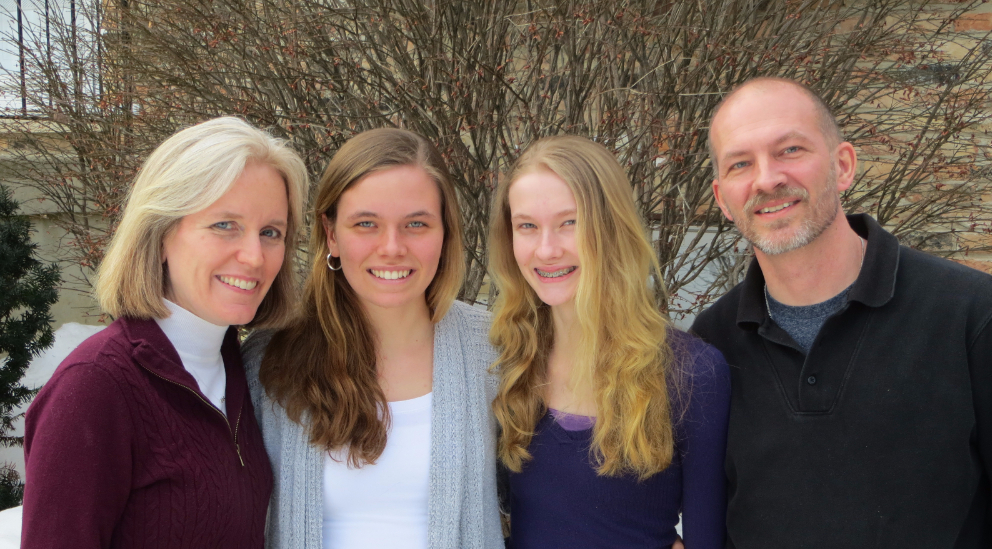One of the biggest personal concerns for missionary families who work overseas is their children’s education. While in some situations attending local schools is an option, this is often not the case. Families want their children to be able to transition back to the school system in their home countries, and must find solutions to make this possible. While many parents therefore choose to home-school their children through primary school, they look for a traditional school setting for the high school years.
Such was the case for our family. We serve with Wycliffe Bible Translators in Central African Republic. For 11 years, we lived in a remote village named Bilolo, working with a team to translate the Bible into the Mpyemo language. Having turned over leadership of that program, we relocated to the capital city Bangui in 2012 to serve in linguistic support for the ten translation projects happening in the country. While living in the village, we were able to access the resources necessary to homeschool Christina and Kylie throughout elementary school, and we thoroughly enjoyed that time. Just living there provided a rich education in itself. However, when our oldest daughter Christina reached 8
th grade, it would have been difficult to carry on with homeschooling in the village. From the academic perspective, there was no library or internet connection in the village; not even a snail mail service for sending and receiving materials. Socially, there were no opportunities for our kids to be involved in organized extra-curricular activities in the village. Even the Central African teenagers who wanted to pursue a secondary education had to go live in the town 25 kilometers away since the village school only went to the equivalent of 6th grade. And in fact, many teenage girls who did not go to secondary school would soon be married and starting families. And so we chose to send first Christina, and later Kylie, to Rain Forest International School (RFIS) in Yaounde, Cameroon when each one reached 8th grade. With the school being a 3-day drive away, this meant they also had to board in one of the hostels where students, whose families were far way, lived. Although we were sorry to be separated as a family, the opportunity for our girls to attend that school was what enabled us to continue living and working in Central African Republic. We are so grateful for a school and hostel where we felt confident that the girls not only benefited from an excellent academic education, but furthermore, where they grew and thrived in so many other ways.
And we are just one family which has been blessed by RFIS and the associated hostels. Many, many other missionary families have been able to carry on with their ministries with the assurance of a good education and wholesome setting for their children because of the dedication of those who make RFIS and the hostels happen.
Rain Forest International School (RFIS), located in Yaounde, Cameroon, was founded cooperatively by several mission organizations to meet this need for quality education. It offers a certified international secondary education (grades 7-12) that is permeated with a Christian worldview. Though the student body is very international, English is the language of instruction. The school serves the children of parents with numerous mission agencies as well as the greater expatriate and national communities in central Sub-Saharan Africa. The majority of the teachers are full-time missionaries whose mission is to teach kids so that their parents are able to carry out their missionary outreach. These teachers and staff take this responsibility seriously and invest in students far beyond academics. Christina and Kylie loved being part of the RFIS community. With enrollment ranging from 80 to 100 students, everyone knows each other—an aspect that both girls will quickly mention as an advantage of the school.
While many of the students’ families live and work in Yaounde, Cameroon, there are those like our own daughters who must board. For this there are a couple of hostels, run separately from the school, though they still work closely together. Each one houses about 12 students who are cared for by a married couple (referred to as “hostel parents”). The goal is to make it feel like a large family rather than a dormitory. Christina and Kylie thoroughly enjoyed hostel life, and now have quite an extended family of “hostel siblings”. While Christina has now graduated, Kylie still plans to attend RFIS and will need to live in the hostel for two more years. But there is a problem for the upcoming school year.
Currently there is no couple to serve as hostel parents. And of course, without hostel parents, the hostel would have to close down, requiring all of those students, including Kylie, to find other solutions for lodging. Thus, we have been asked if we would be willing to fill the role for one year. This is not what we intended to be doing, since, after two years of being gone from CAR due to the war, the door now appears to be open for us to return. There are some exciting possibilities ahead, and we would very much like to be back in CAR. However, if there is no place for Kylie to live for school, then we would need to move to Cameroon, and continue to work from a distance. Although we have agreed to be the back up solution, we are eagerly looking for a couple that would feel God’s call to specifically serve in this role. Truly, it is a position that not only is a great opportunity to minister to the students themselves, but also enables mission work in distant places. If you or someone you know might be interested in this, please contact us at
maria_festen@sil.org. We’d be happy to talk with you and send you a more detailed description of the role.

